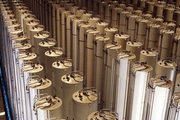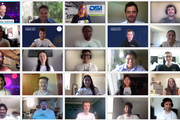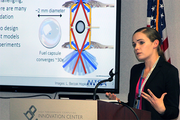Did you know we have a monthly newsletter? View past volumes and subscribe.
Scientific discovery for stockpile stewardship
Sept. 27, 2022 -
Among the significant scientific discoveries that have helped ensure the reliability of the nation’s nuclear stockpile is the advancement of cognitive simulation. In cognitive simulation, researchers are developing AI/ML algorithms and software to retrain part of this model on the experimental data itself. The result is a model that “knows the best of both worlds,” says Brian Spears, a...
LLNL to cooperate with University of Utah's one oneAPI Center of Excellence
Sept. 21, 2022 -
The University of Utah has announced the creation of a new oneAPI Center of Excellence focused on developing portable, scalable and performant data compression techniques. The oneAPI Center will be headed out of the University of Utah’s Center for Extreme Data Management Analysis and Visualization (CEDMAV) and will involve the cooperation of LLNL’s Center for Applied Scientific Computing. It...
S&TR cover story: The ACES in our hand
Sept. 20, 2022 -
Uranium enrichment is central to providing fuel to nuclear reactors, even those intended only for power generation. With minor modifications, however, this process can be altered to yield highly enriched uranium for use in nuclear weapons. The world’s need for nuclear fuel coexists with an ever-present danger—that a nonnuclear weapons nation-state possessing enrichment technology could...
Lab researchers win top award for machine learning-based approach to ICF experiments
Aug. 4, 2022 -
The IEEE Nuclear and Plasma Sciences Society (NPSS) announced an LLNL team as the winner of its 2022 Transactions on Plasma Science Best Paper Award for their work applying machine learning to inertial confinement fusion (ICF) experiments. In the paper, lead author Kelli Humbird and co-authors propose a novel technique for calibrating ICF experiments by combining machine learning with...
An open-source, data-science toolkit for energy: GridDS
Aug. 2, 2022 -
As the number of smart meters and the demand for energy is expected to increase by 50% by 2050, so will the amount of data those smart meters produce. While energy standards have enabled large-scale data collection and storage, maximizing this data to mitigate costs and consumer demand has been an ongoing focus of energy research. An LLNL team has developed GridDS—an open-source, data-science...
Defending U.S. critical infrastructure from nation-state cyberattacks
July 21, 2022 -
For many years, LLNL has been conducting research on cybersecurity, as well as defending its systems and networks from cyberattacks. The Lab has developed an array of capabilities to detect and defend against cyberintruders targeting IT networks and worked with government agencies and private-sector partners to share its cybersecurity knowledge to the wider cyberdefense community. LLNL has...
UC Merced students work with LLNL mentors on potential new drugs to combat COVID-19
June 30, 2022 -
Students from the University of California, Merced worked with mentors at LLNL to identify drug compounds that could be used to treat COVID-19 during a two-week Data Science Challenge (DSC) that concluded on June 6. For the first time in the DSC series since the COVID-19 pandemic began in 2020, Lab mentors visited the college campus to provide in-person guidance for five teams of UC Merced...
CASC team wins best paper at visualization symposium
May 25, 2022 -
A research team from LLNL’s Center for Applied Scientific Computing won Best Paper at the 15th IEEE Pacific Visualization Symposium (PacificVis), which was held virtually on April 11–14. Computer scientists Harsh Bhatia, Peer-Timo Bremer, and Peter Lindstrom collaborated with University of Utah colleagues Duong Hoang, Nate Morrical, and Valerio Pascucci on “AMM: Adaptive Multilinear Meshes.”...
Data Science Challenge welcomes UC Riverside
Oct. 11, 2021 -
Together with LLNL’s Center for Applied Scientific Computing (CASC), the DSI welcomed a new academic partner to the 2021 Data Science Challenge (DSC) internship program: the University of California (UC) Riverside campus. The intensive program has run for three years with UC Merced, and it tasks undergraduate and graduate students with addressing a real-world scientific problem using data...
Visualization software stands the test of time
Sept. 13, 2021 -
In the decades since LLNL’s founding, the technology used in pursuit of the Laboratory’s national security mission has changed over time. For example, studying scientific phenomena and predicting their behaviors require increasingly robust, high-resolution simulations. These crucial tasks compound the demands on high-performance computing hardware and software, which must continually be...
Virtual LLNL-UC Merced Data Science Challenge tackles asteroid detection though machine learning
June 25, 2021 -
Over three weeks, students from the University of California, Merced collaborated online with mentors at LLNL to tackle a real-world challenge problem: using machine learning to identify potentially hazardous asteroids that could pose an existential threat to humanity. Throughout the event, the teams tackled problems around the theme of “Astronomy for Planetary Defense.” For the main...
Brian Gallagher combines science with service
June 20, 2021 -
Brian Gallagher works on applications of machine learning for a variety of science and national security questions. He’s also a group leader, student mentor, and the new director of LLNL’s Data Science Challenge. The Lab has enabled Gallagher to combine scientific pursuits with leadership positions and people-focused responsibilities. “For a long time, my primary motivation was learning new...
Laser-driven ion acceleration with deep learning
May 25, 2021 -
While advances in machine learning over the past decade have made significant impacts in applications such as image classification, natural language processing and pattern recognition, scientific endeavors have only just begun to leverage this technology. This is most notable in processing large quantities of data from experiments. Research conducted at LLNL is the first to apply neural...
The data-driven future of extreme physics
May 19, 2021 -
By applying modern machine learning and data science methods to “extreme” plasma physics, researchers can gain insight into our universe and find clues about creating a limitless amount of energy. In a recent perspective published in Nature, LLNL scientists and international collaborators outline key challenges and future directions in using machine learning and other data-driven techniques...
Advanced Data Analytics for Proliferation Detection shares technical advances during two-day meeting
May 7, 2021 -
The Advanced Data Analytics for Proliferation Detection (ADAPD) program held a two-day virtual technical exchange meeting recently. The goal of the meeting was to highlight the science-based and data-driven analysis work conducted by ADAPD to advance the state-of-the-art to accelerate artificial intelligence (AI) innovation and develop AI-enabled systems to enhance the United States’...
LLNL physicist wins Young Former Student award
Dec. 16, 2020 -
Texas A&M University’s Department of Nuclear Engineering on December 10 announced it has honored LLNL physicist Kelli Humbird with its 2020-21 Young Former Student award for her work at LLNL in combining machine learning with inertial confinement fusion (ICF) research. Humbird graduated from Texas A&M with a PhD in nuclear engineering in 2019. Since joining the Laboratory as an intern in 2016...
DOE announces five new energy projects at LLNL
Nov. 13, 2020 -
The DOE today announced two rounds of awards for the High Performance Computing for Energy Innovation Program HPC4EI), including five projects at LLNL. HPC4EI connects industry with the computational resources and expertise of the DOE national laboratories to solve challenges in manufacturing, accelerate discovery and adoption of new materials and improve energy efficiency. The awards were...
From intern to mentor, Nisha Mulakken builds a career in bioinformatics
Nov. 3, 2020 -
The COVID-19 pandemic has sparked a wave of new research and development at the Lab, and Nisha Mulakken is very busy. The biostatistician has enhanced the Lawrence Livermore Microbial Detection Array (LLMDA) system with detection capability for all variants of SARS-CoV-2. The technology detects a broad range of organisms—viruses, bacteria, archaea, protozoa, and fungi—and has demonstrated...
The internship that launched a machine-learning target revolution
Oct. 1, 2020 -
Kelli Humbird came to LLNL as a student intern and became a teacher of new data science techniques. In this profile, she describes her experiences and the path that led to her research inertial confinement fusion. Read more at the National Ignition Facility.
Lockdown doesn’t hinder annual Data Science Challenge
June 26, 2020 -
Due to the COVID-19 pandemic and shelter-in-place restrictions, this year’s Data Science Challenge with the University of California, Merced was an all-virtual offering. The two-week challenge involved 21 UC Merced students who worked from their homes through video conferencing and chat programs to develop machine learning models capable of differentiating potentially explosive materials from...























